-

-
- 2009 Film Review -
Quantum of Solace
-
-
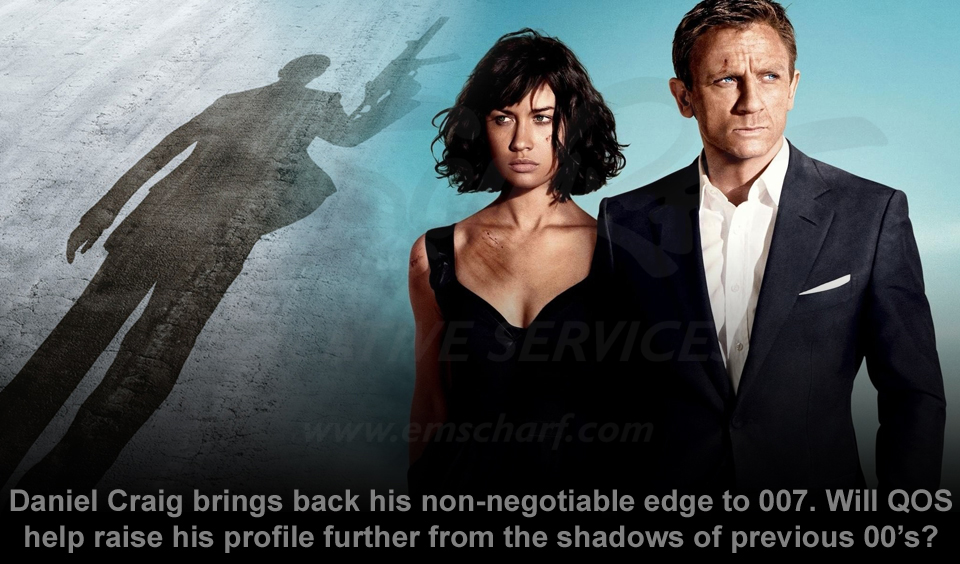
-
- April 17,
2009
- By Eric M. Scharf
-
- It is a rare, non-generation-X,
non-generation-Y ("Why? WHY?!") person who does not
have some level of appreciation for 007. "The Media Magnate" is not part of that
minority, having enjoyed (to different levels of satisfaction) every 007 film in existence.
Even loyal fans, however, still must rise to the
challenge of accepting the inevitable change from one actor to the
next in the lead role of
007 films. "Diamonds Are Forever," but – as long as there is
enough of a fan following and film funding – actors will inevitably
continue to come and go (through reasons ranging from poor casting
to ageism to retirement to tragedy).
Perhaps – one day in the
not-so-distant future – digital doppelgangers will prove a serious
solution (with hyper-accurate, highly-articulated, photorealistic 3D
representations of famous film stars without the sadistic
side-effects of "Death Becomes Her").
The famous film series (based upon a British Secret Service agent
created in 1953 by writer Ian Fleming) began with the brilliance of Sean Connery, followed by an
unappreciated radar blip by George Lazenby. Roger
Moore quite literally came to the rescue – with a more humorous, more
gentlemanly but
still successful run of seven films – after it was determined Lazenby
was not going to be the long-term solution to Connery’s departure.
After it was learned that Pierce Brosnan was not going to be let out
of a fifth season of Remington Steele, a much harder edge and
no-nonsense approach was introduced to audiences with Timothy
Dalton. After two films, a little-known effort was being
aggressively made towards a third tour of 007 for Dalton. A
high-tech themed script treatment was at-the-ready, directors were
being interviewed, and the energy was there. A painfully protracted
legal dispute between Eon Productions and MGM, however, delayed
planning for that film indefinitely, giving the impressively
patient Dalton an exit he could no longer pass up.
"What If" will always linger with some 007 fans, but a new
direction was for probably for the best, with the strong
suggestion that studio executives were reluctant to give up on
deficient scripts and concerns over the role becoming too serious.
Nonetheless, a much more intense flavor of Dalton’s style would be seen,
again, years later.
Then – with legal issues having been solved six years later –
another opportunity seemingly lost forever had finally been
achieved. Remington Steele had taken has final bow, and a
still-energized Pierce Brosnan was brought on board to play “Bond,
James Bond.” Brosnan conveyed a hybrid of the charm and
deadly capability displayed by former leads Connery and Moore, while
retaining some of Dalton’s edge as well.
007 appeared to be on the way back to top-billing with filmgoers
everywhere when the film studios evidently determined that Bond,
once more, had to get younger and more physically capable. There was
some waffling by the studios once public reaction began to turn
ugly. They went back to the bargaining table with Brosnan – who
stated that he still preferred to continue with 007 even after being
unceremoniously kicked to the curb – but an amicable solution could
not be arranged.
Brosnan put down his famous martini
and Walther PPK for the last
time and walked away from the franchise, never to return, at a
time when the studios had low confidence a quality successor to Brosnan
could be found. There was nothing wrong with Brosnan, who
probably had at least three to four more 007 films in him. Studio
executives may
have had the best of long-term intentions, but they unnecessarily
created a problem for themselves.
This scenario brings us to the present, where we find ourselves
watching the hardest edge ever to play James Bond, 007: Daniel
Craig.
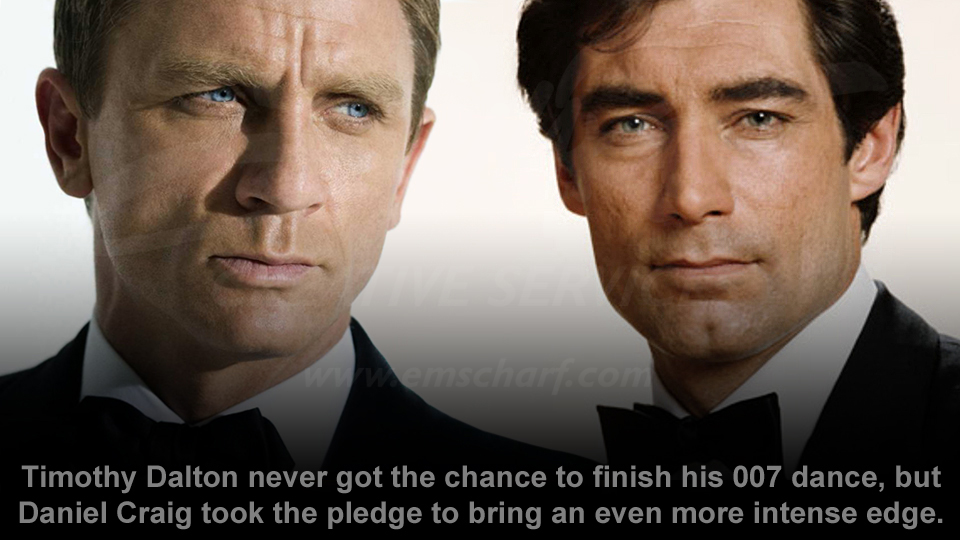
-
- Mr. Craig first assumed the mantle of the coolest, most mysterious,
most seductive secret agent in the history of MI6 with the remake of
“Casino Royale.” His brand of Bond – although driven by the given script,
of course – is
one (currently) devoid of the need for so many incredible gadgets
of which 007 fans have been so accustomed and learned
to excitedly crave with the announcement of each and every new film.
The gadgets, thus-far, all seem to be based upon real world products
for branding tie-ins. Cell phones – used throughout
Craig’s first two films as Bond – are one good example. Hollywood film-making has become as much about marketing a film
(and products and services portrayed within that film) as it is about making a
film, let alone a good one.
Craig’s Bond is hardened from his experiences without the convenient
creature comforts typically provided by Q. This new Bond has proven
he can exist and succeed with no more than his incredibly sharp
mind, deadly combat skills, and pinpoint accuracy against anyone
unfortunate enough to become his target or an obstacle in his path.
He will accomplish his mission without even the shirt on his back
(as in “Casino Royale”), being, by far, the most physically fit 007
since Sean Connery in his earliest Bond film. Craig has converted
007 into the kind of secret agent who can, indeed, terminate an
international criminal with a single strand of their own hair. If
you go by some of Ian Fleming’s earliest Bond stories – and if the
studios’ aim is to adhere more closely to those stories – Craig
appears to be on the right track.
“Casino Royale” can be summed up by The Media Magnate's singularly-held
(?) theory that it was merely the first film in a series of
'etiquette courses' for a nearly unstoppable force in
Craig’s 007 – who cares not for playing any games with his enemies – and who would gladly dismiss the pleasantries and subtleties with
which fans are so familiar . . . for one efficient direct shot.
Craig's 007 lives the line "no more foreplay" from 1995's "GoldenEye"
– regardless of whether his 'playing' partner is a beautiful woman
or a uniquely-scarred villain – and he does it all with the patience of Dirty Harry, one of The Media Magnate's all-time favorite film characters.
This new 007 does, indeed, know how to navigate a China shop like a
silk scarf floating effortlessly on a gust of wind but – like Dirty
Harry – he simply prefers doing it like a Brahma bull, as the enemy
deserves no quarter, unless this 007 is absolutely forced to
"kill them with (just a little) kindness."
The following “Casino Royale” exchange between 007 and M – played
once more by the wonderful Dame Judi Dench – supports the irritating
transformation 007 must endure in order to show M that her faith in
him has not been misplaced.
James Bond: “So you want me to be half-monk, half-hit man.”
M: “Any thug can kill. I need you to take your ego out of the
equation.”
They realize they need each other, but neither will admit it, and
neither will give a centimeter unless forced / ordered to do so. The tension
– which lasts the entire film – is so thick you need a chainsaw to cut
through it.
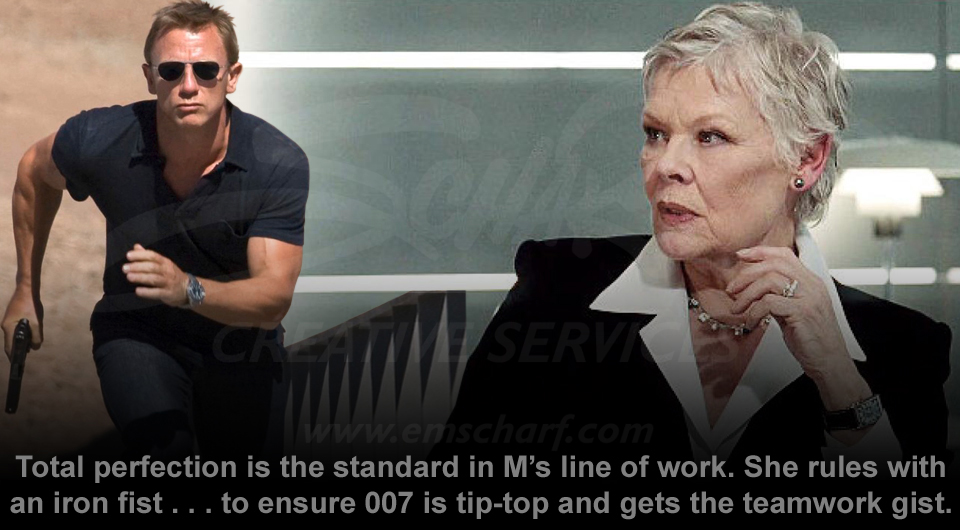
-
- Craig brings more of the same and a
bit more involuntary refinement in “Quantum of Solace (QOS)," – beginning on the final breath of “Casino Royale”
– with
some of the same supporting actors and double the physical action.
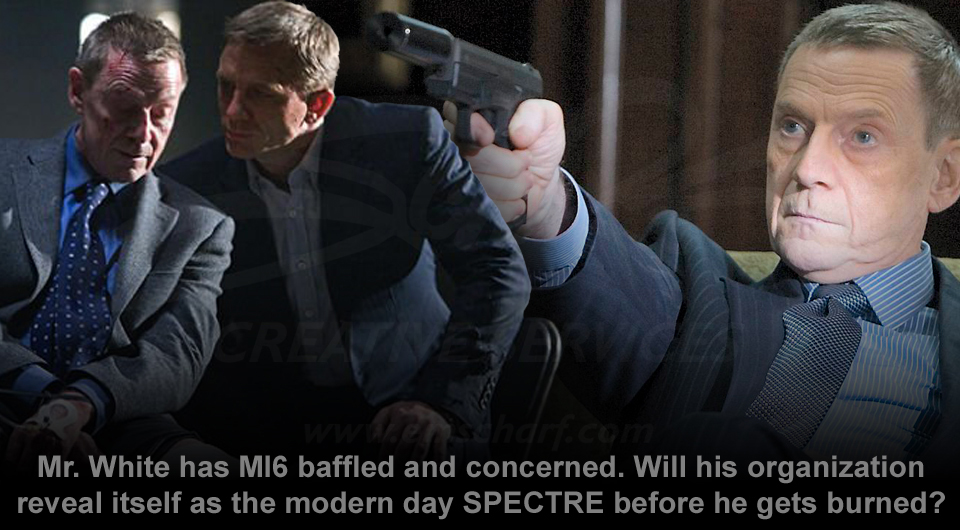 -
-
Mr. White – the man responsible for
the demise of both Vesper Lynd and Le Chiffre – has unofficially been
brought to justice, as MI6 prepares to interrogate him in a
dungeon-like setting for information on the bigger picture of his
crime network. While a bit of a stretch, this seems to me like a
subtle introduction to the equivalent of SPECTRE (SPecial
Executive for Counter-intelligence, Terrorism,
Revenge and Extortion) or what might become known as SPECTRE in future Craig-driven Bond films.
Mr. White is cool as a cucumber, pointing out to everyone – in the
make-shift interrogation room – that his organization’s tentacles run
very deep in so many places, including MI6. M seems to quiver ever so
slightly before firmly correcting Mr. White – insisting that he will,
indeed, talk.
Before moviegoers get the opportunity to hear and savor any intelligence
data, M’s right hand man and personal body guard turns on his boss
and attempts to free Mr. White, who is accidently shot in the leg.
The body guard-turned-traitor dashes up the stairs with Bond hot on
his heals. Bond gets his man, only to return to M having to explain
how – yet again – a potential source of information has been
permanently 'retired' at his hands. This is made even worse by a now-missing Mr.
White, whose proof of existence is marked only by the blood stain
where he had been seated.
M’s trust issues with the agent she once referred to as a “blunt
object” continue to grow. Losing one of her most reliable and
trusted team members – along with Mr. White – shakes her confidence
and leaves her grasping for answers, before we have even been
introduced to Bond’s latest enemy. After all, M has a boss, too, and
those answers become even harder to produce when your own department
has been infiltrated by an unknown number of agents of evil.
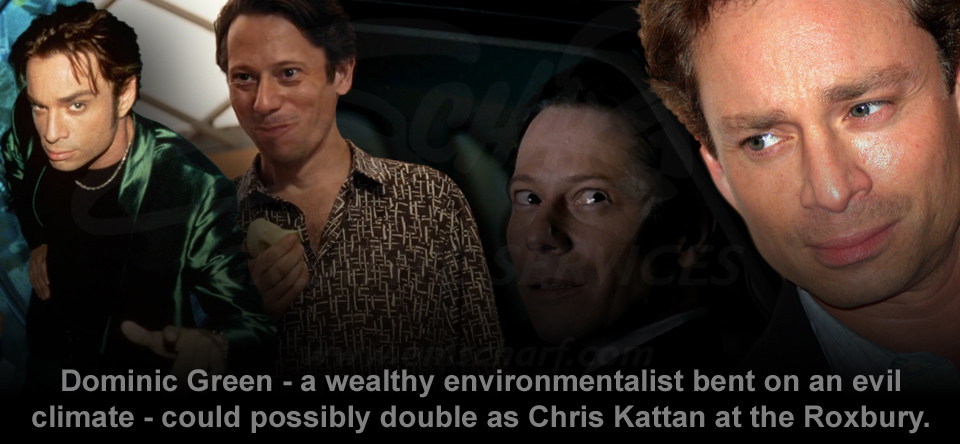
-
- Dominic Greene – played by Mathieu Amalric
– is a world renowned technology giant and
environmentalist-turned-bad-guy who loosely, visually reminds of
actor-comedian Chris Kattan. There were moments in QOS when The
Media Magnate
half-expected the scene to get dark, a disco ball to drop down,
hear “What is Love” begin to play, and see Amalric
begin that same violent, sideways head shake made famous by
the Butabi brothers in “A Night at the Roxbury.” One of Greene's
bodyguards resembling Will Ferrell would have left The Media Magnate
rolling on the sticky soda-covered theater floor.
Nonetheless, the amazing, beautiful, and sinister-looking locations
– with which we are all familiar from previous Bond films – simply melt
away in QOS. There are just locations, bad guys, Bond, Bond's
constituents, and the common objects of desire (goals and
counteractions) that keep them all
glued together for the length of the film.
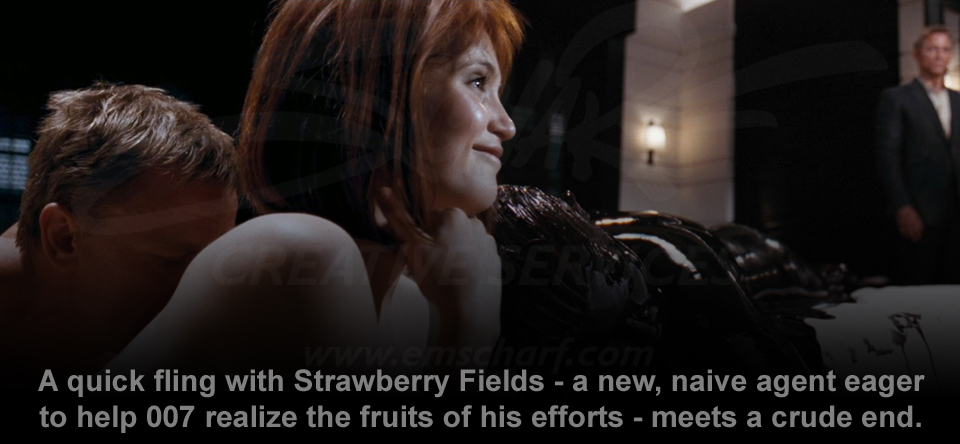
-
- There is no (aggressive) love
conquest or interest for Bond this time around.
Bond's former loss of the water-logged Lynd may have had a(n
extended) chilling effect, but the edgy-and-attractive Bolivian spy, Camille
(played by Olga Kurylenko), had other things on her mind. Fellow Bolivian General Medrano murdered her
entire family right in front of her when she was young, and Camille
– like Inigo Montoya from "Princess Bride" – was preparing for
permanent payback.
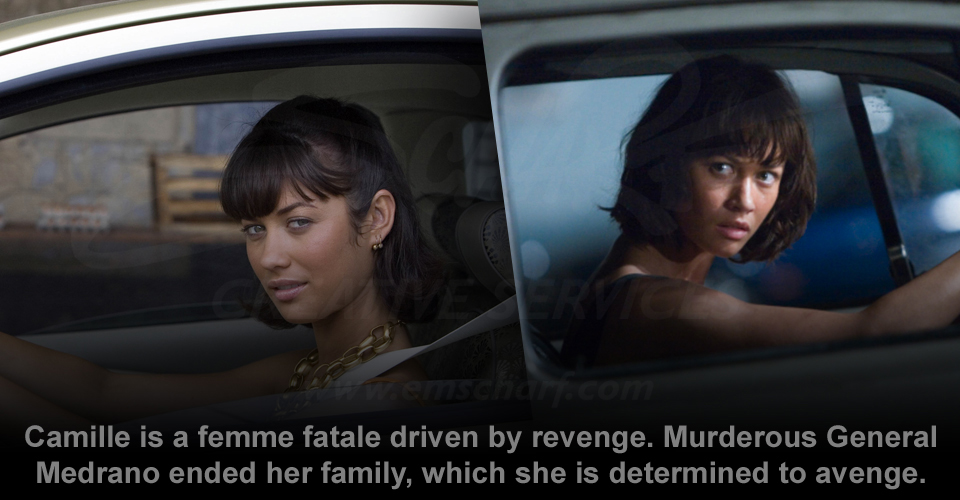
-
- Though Bond continues to give M and
everyone else a purposely quizzical look whenever he is accused of
functioning if always out for revenge, he finds himself in welcoming
company with Camille. Revenge would, in fact, have come very early for
Camille if Bond had not prevented her
from ending Medrano’s life (and unknowingly prevented the removal of Greene’s
key playing partner in the military coup being planning for the
Bolivian government).
It was somewhat disappointing, however, to see her
character degenerate from such a hostile beginning to such a weak finale, as she struggles mightily to complete her
(overly personal) mission objective under less
than imposing circumstances. At the very moment of her pending
success, the horrible memories of losing her family come raging back
and – instead of fueling her to finish – she cracks. Bond is forced to assist in a
situation where even he appears to have overestimated Camille's
capabilities.
- Most 007 fans have been conditioned
– with past
films – to expect Bond to calmly come to the rescue of the damsel in
distress, no matter how well-trained she may be, but there is no
such act in QOS. Bond actually appears surprised that Camille is
having any real difficulty, and while it is refreshing to see Bond
capable of such an alternative viewpoint of a woman in the same line
of work, The Media Magnate would have preferred to see Camille keep her dignity and finish what she started.
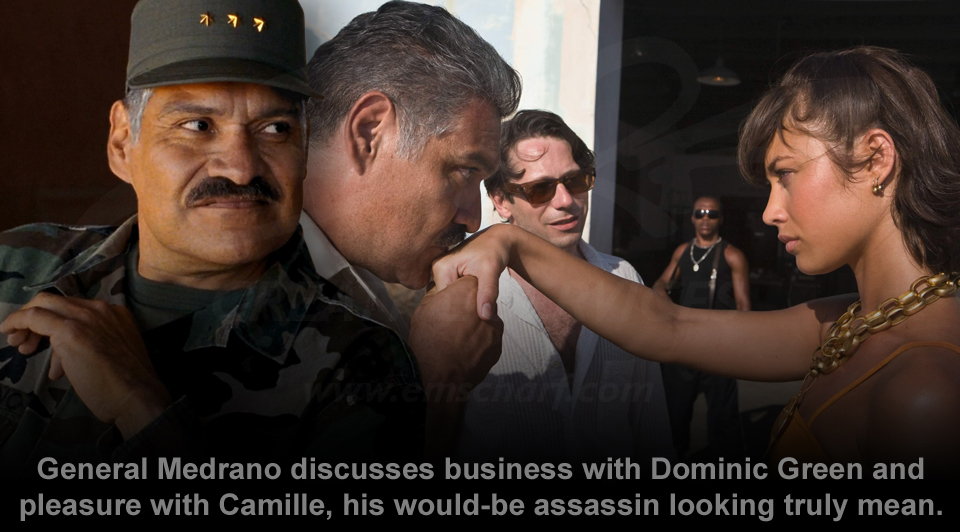
-
- It should come as no surprise that Bond spends at least half of the
film having to dodge murderous accusations and live munitions being
fired at him by his own countrymen because – as with “Casino
Royale” – he continues to have a bad case of being in the right place
at the wrong time. This can be attributed to MI6
being led to the scene of a hotel room crime just as Bond arrives.
He seems snake bitten in his desire to get M off his
back, by performing up to her (unreasonable) standards. The harder
he tries to refine his approach, the (occasionally) more extreme his
results.
His bad timing enforces 'his own' rules once again and – with MI6
cutting off all of his monetary and travel resources – he must seek
help from a familiar-if-understandably-unfriendly face in Rene
Mathis (played by Giancarlo Giannini). We quickly learn that Bond was wrong in accusing Mathis of
being a double agent in the last film. Mathis strangely seems to
understand and even forgive Bond, even though it was clear that
Mathis was treated like an enemy combatant once the accusation was
made.
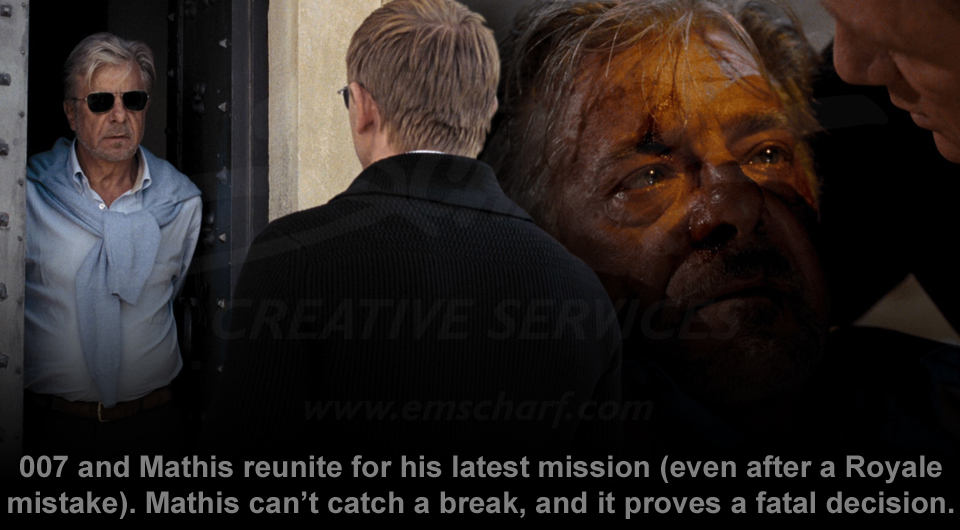
-
- Mathis – ever the reliable
connections guy – makes sure Bond is back on his feet in no time,
even accompanying him back into the lair of the beast to help him
succeed in his mission. Mathis introduces Bond to the local chief of
police who – upon introduction – professes his support and resources to
Bond. Mathis's return to action, sadly, does not last through the
night, as he is shot and stuffed into the back
of a vehicle by that very same officer. Mathis' cash connection
deals him a terminal rejection.
-
- Bond and Camille – the bad timing
twins – are caught attempting to leave in the
very same vehicle, only to discover Mathis’s withering body. And still
– with what little strength he has left – Mathis manages to help
save Bond, again, before another gun shot wound ends his life. It is
a tragic end to one of Bond’s shrinking number of reliable sources.
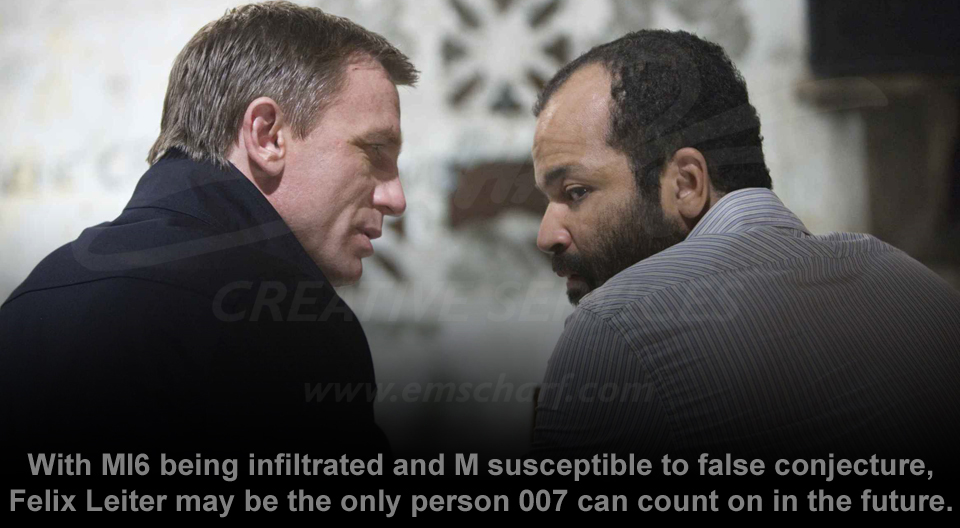
-
- Mathis was not the only familiar
face with whom Bond would cross paths, as his fast friend and U.S.
counterpart, Felix Leiter (played by Jeffrey Wright), also does his
part to decrease the trouble Bond is facing. Leiter’s timely presence in that part of the world is explained as
a component of the U.S. path of least resistance policy.
-
- Wright does
an excellent job – in his limited role – and I would be pleased to see
him in future 007 films, continuing to offer his calming, mature
influence, as he did in “Casino Royale” (when Bond wanted to break
ranks and go after Le Chiffre directly, rather than return to the
poker table to continue “playing the game”).
Even with the 'plot within a plot' turmoil that ensues – and continues
to build as the film progresses – Bond starts to display more
of the focus M has been seeking, while he succeeds in conquering two
of his bigger demons and a piece of another by film’s end. He
receives a quantum of solace and little more in avenging the death
of his one-time love, Vesper Lynd, though, and – as a man of his word
– she
was out of sight and out of mind during this latest mission.
-
- Bond
helps his revenge-mate, Camille, escape unharmed from Greene’s
self-destructing fuel cell-powered lair. He also manages to kill
neither Greene nor Vesper’s ex-boyfriend (his brief follow-on
mission). Greene succumbed to the desert heat, finishing himself
with a deadly drink that would quench his thirst.
007 taking these two men alive – rather than using his
license to kill should vault him out of M’s dog house – but the
audience knows
it will not be that easy. M is an impatient mother who expects her
stubborn mutt to behave like a pure breed in unreasonably few
training sessions. M is in the unenviable position, however, of requiring
refined results from an orphan and independent thinker – in
007 – whom she cannot (yet) control like her other
agents.
M upgraded Bond’s status to 00 before the events of “Casino Royale,” and she will
have to endure his on-the-job refinement, step by painful step,
until she is satisfied or relents on her requirements.
Perhaps the next Bond
film will contain a scene that helps kill two birds with one stone,
(1) where M explains to 007 that if she is
to really trust him – and see him
successfully evolve into the MI6 agent she requires – she must
also give him a complete arsenal of tools with which to work. (2) M
officially introduces 007 to Q and off we go to the next
etiquette course (which – ideally – results in more villains being
captured than killed dead and absent the collateral damage
that turns M's face red).
EON is well aware
of the huge number of Bond fans who are perplexed by the continued
absence of the traditionally suave and physically-capable Bond
(instead of either / or), as
well as Q’s incredible and ever-expanding library of fantastic toys.
EON can count The Media Magnate as one Bond fan who has no
problem with 007 being rebuilt as an unstoppable modern day MI6
mercenary, who is carefully transformed – over the course of 3 or 4
films – into a willing gentleman who can kill with but a look, with
amazing devices at his disposal . . . but never with the desperate need
to use any of them.
|